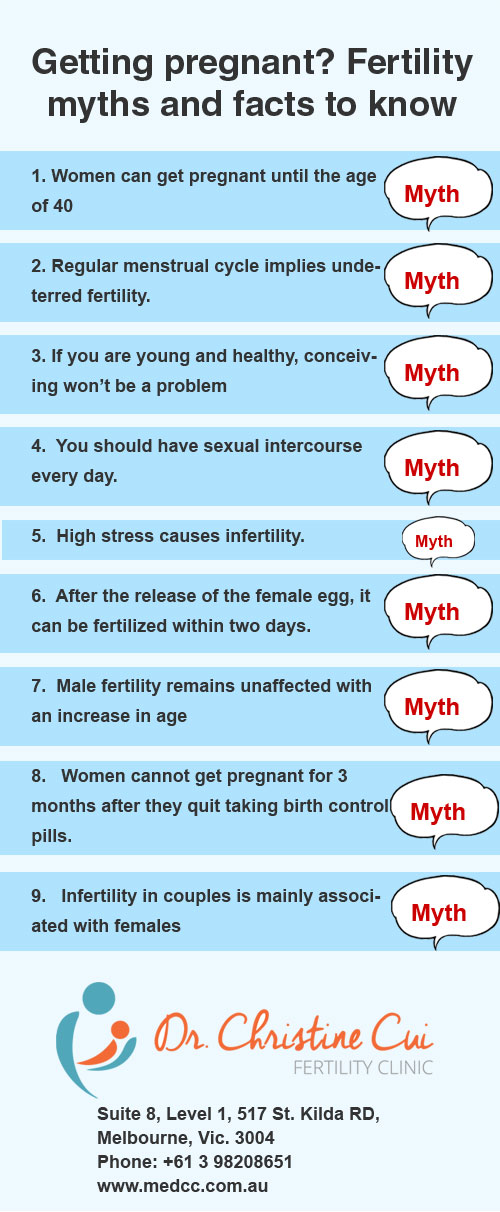
Most couples have a strong desire to have a baby and embrace parenthood at some point in their lifetime. Often time, not being able to conceive in spite of being perfectly healthy could be stressful for such couples. Therefore understanding the process of natural fertility and its importance can help couples to know when to consult their physician.
Most couples successfully conceive within one year of trying. There are also recorded cases in which couples conceived in the second year after trying. But few times the causes of infertility remain uncertain further adding to the couple’s frustrations.
However, couples should not feel disheartened and know that they are not alone. There are various treatments available that will assist them in becoming parents and have a perfectly healthy child.
Therefore couples should educate themselves about fertility myths and facts as their first step towards embracing pregnancy.
Female infertility is caused by a wide spectrum of health conditions. Generally, women are diagnosed with infertility when she is unable to conceive within 12 months of trying. While male infertility is associated with abnormal sperm production or any sperm related abnormalities observed in men.
Though medially the causes of infertility are well defined by medical professionals, still fertility-related myths prevail in our society.
Here are some myths and facts revolving around infertility,
Fact: Women’s ability to conceive decreases with their advancing age. Infertility gradually starts declining after the age of 28 and further decreases steeply after the age of 35. By the age of 40, the chances of getting pregnant go down to only 5%.
The women with health conditions like polycystic ovary syndrome also face difficulties in conceiving. Unhealthy lifestyle choices, including alcohol consumption, cigarette smoking further reduces chances of natural fertility.
Fact: Generally regular menstrual cycle for women is of 28 days. While for some women it is perfectly normal to have a menstrual cycle to occur between 21 days to 36 days.
However, the state of the menstrual cycle does indicate your chances of conceiving. Very light flow indicates low levels of estrogen production. Very heavy flow implies imbalanced progesterone levels. But before drawing any conclusions you should consult your physician and track your menstrual cycle accordingly.
Fact: Infertility condition is observed in perfectly healthy couples too. Although maintaining a healthy lifestyle and living conditions do improve chances of conceiving but it is not an indication of high fertility.
Fact: It is not necessary to stress about the number of times you should have any sexual interactions. Couples can try conceiving within women’s ovulating days. It will increase the chances of conceiving. Usually for women ovulation starts roughly 14 days before the next period occurs.
Fact: It is not completely false; stress does contribute towards infertility conditions. Your body reacts differently to stress levels. Therefore trying to reduce stress is favourable for both the partners.
Fact: The eggs released from women’s body can be fertilized within 12 hours to 24 hours. Therefore the tracking ovulation cycle is often suggested by physicians.
Fact: Like women, men also infertility issues with further advancement in their age. Infertility in older men is majorly caused due to falling levels of testosterone levels, decreasing quality and quantity of sperm etc.
Fact: Women can get pregnant almost immediately after they quit taking their birth control pills. After women stop taking these pills their hormones levels return to normal and hence face no difficulties in conceiving.
Fact: Infertility is observed in both men and women equally. Many times the main reason for not conceiving is the factors contributed by both partners. Couples should make an effort in understanding these myths and related facts and should seek help when necessary. There are various treatments available like IVF and acupuncture in Melbourne that can assist couples in successfully conceiving and help them overcome the infertility hurdle.
